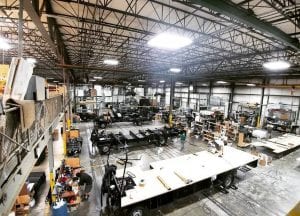EDITOR’S NOTE: The following is an excerpt from a column publshed Sunday (April 5) by James Briggs in The Indianapolis Star, who discussed the reasons why the RV industry could emerge from the pandemic uniquely positioned to capitalize on people’s likely desire to move about the country in the relative safety of an RV.
Elkhart is one of the most famous small cities in Indiana for a bad reason: It has a volatile economy that ebbs and flows depending on how many people are buying recreational vehicles at any given time.
Nearly 90% of RVs are manufactured in Elkhart County, which has a population of about 206,000. As of February, there were more than 65,000 manufacturing jobs there, about half of which were tied to the RV industry. Those numbers paint a picture of an economy that is highly dependent on consumers’ desire and ability to purchase an expensive luxury product.
That means when the U.S. economy is generally good, as it has been for several years, RVs are selling and Elkhart is booming. When the economy goes through a recession, as it did from late 2007 through early 2009, Elkhart gets clobbered because the RV industry reduces production.
Now that the economy has gone into hibernation amid the COVID-19 pandemic, unemployment data shows we’re spiraling into recession — or, perhaps something even worse that we don’t have a name for yet. That seems like especially terrible news for Elkhart, which topped out at an unemployment rate above 19% in early 2009 even as the statewide jobless rate stayed below 11%.
But this is not a normal economic downturn — and Elkhart’s overabundance of RV manufacturing might make it uniquely well positioned to weather the economic effects of the pandemic better than other cities.
At least, that’s a storyline that RV executives are pitching. And they might be right.
For now, Elkhart has the same problem as every other part of the country. The major RV players, including Thor Industries Inc. and Winnebago Industries Inc., have shuttered operations in line with social distancing guidelines. But, as people try to stay isolated for perhaps many months, Winnebago CEO Michael Happe thinks consumers who are fortunate enough to have jobs or nest eggs might want to purchase RVs as a way to go on vacation without putting themselves and others at risk.
“We genuinely feel that the emotional and real appeal of the outdoors for end consumers remains as strong as ever and, in some ways, maybe strengthened because of the time people will spend appropriately and safely doing social distancing and quarantine practices,” Happe said last week in an earnings call.
Happe acknowledged the obvious: No one really knows what’s coming. The modern U.S. economy has never shut down in order to address a pandemic, so there are no historical data or trends to help inform how the recovery might go.
“I do couch my comments in some way that we recognize there will be economic implications to the crisis we’re going through as well,” Happe said. “That will also have an effect on the appetite of consumers to buy products like ours, RVs and boats, to spend time in the outdoors. So we believe we’ll see pluses and minuses, but we do believe the RV and boating industries will return to strength at the appropriate time in the future.”
Company executives, of course, are adept at putting the rosiest possible spin even on difficult situations. But Ball State University economist Michael Hicks thinks there might be some merit to Happe’s outlook.
“I’m among the many families who, with kids at home, said maybe this weekend we’ll get the pop-up camper and take it to a state park and hook up where we’re not close to anybody, where we can go fishing and get away from the house,” Hicks said. “You can’t go to a hotel. You can’t go to a restaurant. It may be that RVs are partially immunized by this.”
The RV industry went through a mini-slump from mid-2018 until late last year before rebounding ahead of the pandemic. There were more than 37,000 RV shipments in February, a 2% increase over the previous year, according to the RV Industry Association.

